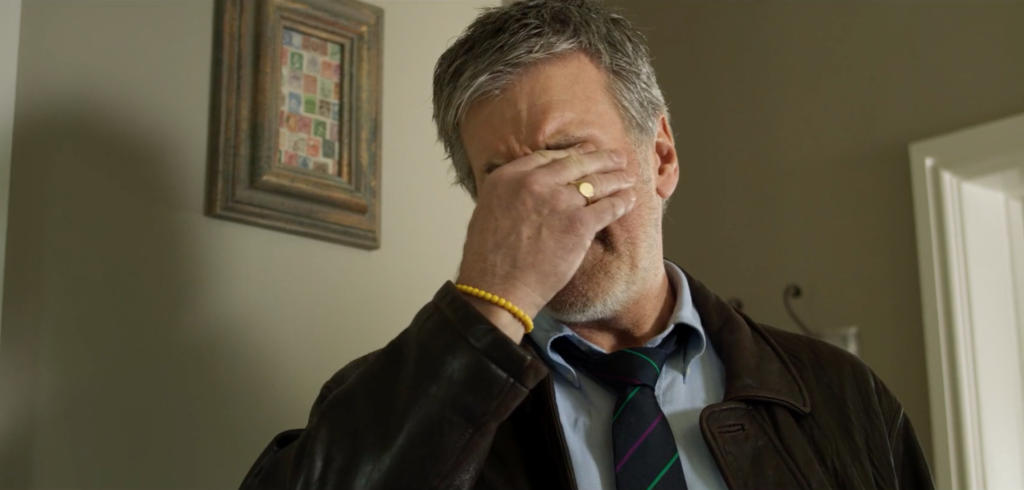“McKinley” is an independent short written by Ben Fowkes and directed by Ben Bloore, which aims to take a look at a police investigation and the psychology of one of the main detectives as he attempts to piece together a murder investigation. It starts with an intruder, a murder, a ‘who-done-it;’ and this might have been a mistake. A psychological film, “McKinley” may have been better to leave it’s opening – and its crime – up to the imagination. It follows the lead down a dark path of his own memories, which threaten to unravel his investigation. But, as psychological and dark as “McKinley” is, it suffers from the plight of many a short film insomuch as it is just too short. We’re barely introduced to its lead before it’s over, a shame, as the film is produced and directed to pristine perfection.
The titular character, Detective Sergeant Josh McKinley (Mark Tunstall), is a gruff, wizened, middle-aged man who, decked out in typical police attire is a curious sort as he wears a yellow beaded bracelet on one wrist that doesn’t seem to match the demeanor of the barbate police officer who wears his depression and weariness on his sleeve. It’s only upon the film’s conclusion, and later considerations, that we find out what this bracelet represents. In this way, “McKinley” is expert. Bloore, at the helm, and Jon O’Neill, the film’s cinematographer, paint the film’s British landscape beautifully, all the way from the posh home that is its’ setting to its rolling fields, to the psychology of not only the film’s main character, but the rest of the film’s cast as well.
“McKinley’ is a film of substance rather than plot, and it shows in both its score, scope, and execution. Bloore et al have decided to go for powerful visuals rather than in-your-face gore and jump scares – even at the film’s opening that depicts a murder. The film is filled with some artistic and tough images. During the first few frames we’re exposed to the image of a boy’s sailboat resting idly on a nightstand as a silhouette of a father beats the boy with a belt for misbehaving, which is especially harrowing. Another sequence, involving a little girl – a seeming memory from a forgotten past – lying still on a grassy knoll is more harrowing still. Though “McKinley’ is too short and fails to take pains to develop its characters more than it does, its visuals are top of the line and its cinematography lush.

The acting is apt, and what you’d expect from a film like this. Tunstall’s McKinley is good enough, most of his on-screen presence represented through facial acting rather than dialogue. He’s motivated and beckoned by some fellow officers played by various sorts (such as Phil Molloy, Jonathan Butler, and Sandra Barber), thought these are as thinly brushed as McKinley himself. A film like this rests on its visuals and its inferences; and I understand this. That said, however, I feel that “McKinley” had a lot to offer, and could have benefitted from another 5-10 minutes of run-time to explain its happenings. The film clocks in at 7 minutes and 8 seconds, including credits, and, while it has a strong beginning and middle, lacks the punch of an ending – and the character development – that it needed.
The film’s sound is credited to a man named Alex Stroud with music by David Beard, and they do a superlative job layering the film’s nuances and score. Part piano, part droning bass, the film invokes the elements of many thriller/horror films I have seen without trying too hard, and underlines the proceedings with that much more grace and wit. “McKinley,” in feel, reminds me of another indie I’ve seen, the terrific “The Guard,” and here utilizes its score and feel to perfection to tell its story. A host of other elements, such a mis-en-scéne, costume design, photography, and production design, make “McKinley” a fine film to behold.
At the end of the day, “McKinley” is a decent film. It layers its atmosphere wonderfully, paints a remarkable visual landscape, and implies its themes with ease and grace. I would love to see what Bloore and company could have done with a little more time on the clock, and look forward to their future projects.

